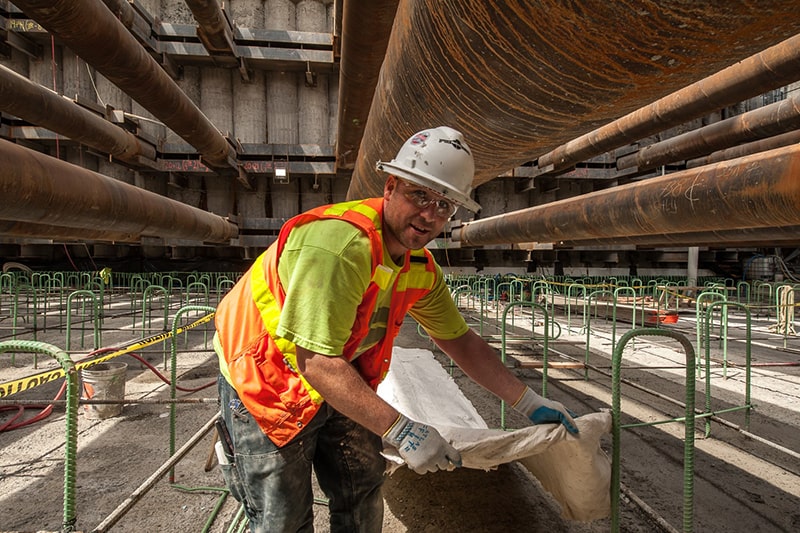Courses
Environmental Laborers Training


Environmental remediation is the process of fixing hazardous substances. It involves removing, treating, and containing pollution or contaminants. You can find these in soil, groundwater, sediment, building materials, paint, coatings, and adhesives. This process is crucial for protecting the environment and public health by reducing the presence of harmful substances.
Remediation can involve various methods categorized as ex-situ (extraction and removal of contamination) or in-situ (treating contamination without removing soils or groundwater). The latter is the preferred method whenever possible.
Environmental remediation specialists play an important role in fixing contamination from industries. These include oil and gas production, chemical production, and groundwater issues. They also address soil contamination, air pollution, and hazardous waste management.
The process typically includes initial site assessment, investigation, remediation plan development, implementation, final validation, and long-term monitoring. We use various technologies for remediation, including solidification and stabilization, soil vapor extraction, bioremediation, and chemical oxidation.
Take a look at the course descriptions below. They will show you what you will learn as a Construction Craft Laborer in remediation work.
Over the past decade, many industries have begun focusing on various environmental practices. Some opt for changes in their manufacturing processes, while others focus on raising awareness.
The construction industry and its impact on our environment are well-known. We’ve witnessed the emergence of numerous alternative building materials that can help preserve our planet. What’s more, construction workers play an essential role in keeping our surroundings safe from harm.
However, they need to be adequately trained to handle and dispose of certain materials and substances. Working in construction can be risky due to numerous unpredictable factors, and as such, proper training is essential.
Consequently, competent construction workers will be able to spot a potentially hazardous situation and act accordingly without putting anyone at risk.
If you want to know why the impact of environmental training is so important, read on.
WHY IS ENVIRONMENTAL TRAINING IMPORTANT?
Environmental issues become more severe with each passing day. This is why both individuals and numerous industries are trying to reduce the impact of pollution.
It’s plain and simple; construction work does affect our communities, especially when it comes to the environment. Luckily, construction workers are here to save the day. Thanks to laborers’ apprenticeship, and the numerous training courses, these people know how to act in a dire situation.
Working on older buildings often implies contact with asbestos, lead, or some other hazardous materials. Competent laborers are trained to prepare the site and dispose of these volatile materials without permanent damage.
Adequately trained individuals can assess whether the situation is dangerous and know how to handle hazardous materials, taking steps to remove the material in question and decontaminate the area safely. Here’s where a reputable laborers training school comes in handy, equipping its members with relevant knowledge.
AVAILABLE COURSES
Environmental remediation training is a complex process that can cover multiple areas. Training centers like ours offer several courses that are equally important. Your training will depend on your place of work and how likely you are to come in contact with one of these materials. The knowledge you gain will help you keep your environment and your colleagues safe from harm. Here’s what each of the courses we offer entails.
ASBESTOS ABATEMENT
While asbestos is not common in modern buildings, it is still present in older building sites. This mineral fiber can be hazardous when inhaled by accident. It is said to cause scarring in the lungs and may even lead to lung cancer. Therefore, it is of utmost importance to have the training and skills to know which course of action to take.
Asbestos abatement is a highly complex operation that doesn’t only imply the removal of the said material but every single process required to manage asbestos safely. Handling and removing asbestos is not something constructors should take for granted. Due to the health hazards this material poses, laborers must successfully pass the training and get certified before being allowed to work in this industry.
HAZARDOUS WASTE OPERATIONS
The contents of this course are pretty straightforward. By the end of it, students are able to dispose of hazardous waste properly. But what constitutes hazardous waste in this day and age? It’s pretty much any waste that can contain toxic substances.
There are four types of hazardous waste — F-list, K-list, P-list, and U-list waste. Each of these is classified according to specific characteristics like toxicity, flammability, reactivity, and corrosivity. It can come in many forms, so construction workers need to be able to identify it and dispose of it safely.
LEAD ABATEMENT
Lead is a dangerous metal that can cause numerous health issues like anemia, kidney, and brain damage. Lead abatement is the process of reducing lead levels and, in some cases, its complete removal. Since prolonged exposure to lead paint can cause an array of health problems, it is imperative to know how to handle it properly.
Lead abatement requires certified professionals who have the expertise local laborers usually don’t possess. A qualified construction worker will be able to assess the situation properly, calculate the risks, and form a plan based on the current state of things.
FINDING THE BEST TRAINING PROVIDER
Dealing with hazardous materials is not a walk in the park. Robust laborers apprenticeship training equips you with the knowledge to help keep our planet safer. If you are interested in an environmental laborers training course, please contact us by calling numbers on our website or completing the contact form at the bottom of this page.
We are available Monday–Friday from 8 a.m. to 5 p.m. Our staff will be glad to answer any course-related questions you may have.